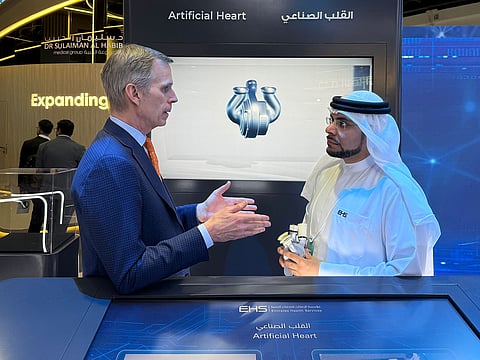Total Artificial Heart, pancreatic cells in liver to avoid insulin: Future of healthcare in UAE unveiled at Arab Health 2025
EHS to implement projects redefining chronic disease care, enhancing quality of life

Dubai: At Arab Health 2025 in Dubai, Emirates Health Services (EHS) is showcasing initiatives advancing heart and diabetes treatments.
The first project is the Total Artificial Heart (TAH), developed in collaboration with the Texas Heart Institute. This partnership aims to introduce “the world’s first total artificial heart using magnetic levitation technology”, with the UAE being the first Middle Eastern country to receive the titanium device once approved by the US Food and Drug Administration (FDA), spokespersons of both entities told Gulf News.
Clinical trials of the device developed by an Australian company are currently underway in the US and Australia, with six patients already implanted.
UAE clinical trials
Dr Omar Al Hajri, Family Medicine Resident at EHS, confirmed that UAE trials will start later this year.
TAH uses a single rotor suspended by electromagnets, eliminating wear and tear and ensuring longevity and reliability, according to Dr Joseph G Rogers, president and CEO of the Texas Heart Institute. Unlike traditional artificial hearts, he said, this device avoids mechanical pumping, addressing the primary cause of failure.
With heart transplants limited by global donor shortages—only 6,000 donors annually—the artificial heart acts as a bridge to transplant.
“It sustains patients with advanced heart failure, reducing reliance on medication and improving quality of life while they await a donor heart,” explained Dr Al Hajri.
The lightweight (79-gram) device is suitable for all ages, and features an external controller for power system without the need for internal batteries.
Pancreatic cells in liver
EHS also presented the Islet Cell Allo-Transplantation project in partnership with the University of Chicago, targeting type 1 diabetes. The method involves transplanting pancreatic cells into the liver using a fine catheter, reducing complications and potentially eliminating the need for insulin.
Clinical trials have shown promising results, and the project has received FDA approval as a safe alternative to traditional pancreatic transplantation. EHS plans to implement this soon.
Dr Essam Al Zarooni, Acting Executive Director of Medical Services at EHS, said: “These projects mark a major leap forward in treating chronic conditions like heart disease and type 1 diabetes, reinforcing our commitment to the National Strategy for Wellbeing 2031.”
Sign up for the Daily Briefing
Get the latest news and updates straight to your inbox


